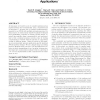Free Online Productivity Tools
i2Speak
i2Symbol
i2OCR
iTex2Img
iWeb2Print
iWeb2Shot
i2Type
iPdf2Split
iPdf2Merge
i2Bopomofo
i2Arabic
i2Style
i2Image
i2PDF
iLatex2Rtf
Sci2ools
110
click to vote
DAC
2003
ACM
2003
ACM
Compiler-generated communication for pipelined FPGA applications
In this paper, we describe a set of compiler analyses and an implementation that automatically map a sequential and un-annotated C program into a pipelined implementation, targeted for an FPGA with multiple external memories. For this purpose, we extend array data-flow analysis techniques from parallelizing compilers to identify pipeline stages, required inter-pipeline stage communication, and opportunities to find a minimal program execution time by trading communication overhead with the amount of computation overlap in different stages. Using the results of this analysis, we automatically generate application-specific pipelined FPGA hardware designs. We use a sample image processing kernel to illustrate these concepts. Our algorithm finds a solution in which transmitting a row of an array between pipeline stages per communication instance leads to a speedup of
Application-specific Pipelined Fpga | Array Data-flow Analysis | DAC 2003 | Design Automation | Pipeline Stages |
Related Content
| Added | 13 Nov 2009 |
| Updated | 13 Nov 2009 |
| Type | Conference |
| Year | 2003 |
| Where | DAC |
| Authors | Heidi E. Ziegler, Mary W. Hall, Pedro C. Diniz |
Comments (0)

